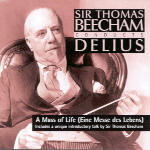Delians and Beecham fans will rejoice at the reissue on CD of this long awaited, legendary recording. Listeners belonging to either of the groups just mentioned may not wish to read further. Not that there’s anything particularly shocking in rehearing this performance after a few decades’ rest. No indeed. There’s still Beecham’s inimitable way with Delius’ musical language, best summarized as a mastery of both rhythm and contrast. For example, at the beginning of part two, Beecham takes the Introduction slower than just about anyone else and drives the ensuing choral passage (“Herauf!”) more vigorously. The result prevents the piece from degenerating into a formless pudding, as so often happens with Delius in less sympathetic hands. No, the old Beecham magic is still very much in operation.
The problem, then, isn’t Beecham: it’s everyone else. Of the soloists, Bruce Boyce is adequate (he’s better in Beecham’s contemporary recording of Sea Drift), stolid for the most part, and no match at all for the competition: Benjamin Luxon (for Groves on EMI), or Peter Coleman-Wright (for Hickox on Chandos). Monica Sinclair sounds like she always does: as if she’s singing Gilbert and Sullivan (something she did very well, incidentally, but that’s another story). She is the very model of the stiff, British oratorio contralto. The others are only fair, as is the London Philharmonic Choir, which sports tremulous sopranos and disappearing tenors, and has a particularly hard time keeping its tone from sagging when singing softly (a problem magnified because, for reasons discussed below, they never actually sound very soft at all).
Finally, the recorded sound is poor even for 1953. It has hardly any dynamic range, and while climaxes remain largely free of distortion, they also completely lack impact and transparency. The great final chorus, with its bells and crashing tam-tam, sounds like an entirely different piece under Groves or Hickox: with proper balances and an ample dynamic range, you can (and should) feel an almost physical thrill at the surging waves of ecstatic brass amid the jubilant intermingling of chorus and soloists. Perversely, this also means that with nothing truly low-level coming out of the speakers, quieter passages take on an uncommon and obviously artificial vividness, and this must in turn inevitably color any estimation of what Beecham’s contribution actually was.
In short, both Groves and Hickox, if not quite as full of contrast or as characterful with this music as Beecham, have much more going for them in almost all other respects. If you want to get to know this marvelous work, try them first, and if you’re hooked, then by all means get this version too. It remains a historically significant memento of one of the great conductor/composer partnerships. [Note: This release is, at present, U.K. only.]
































